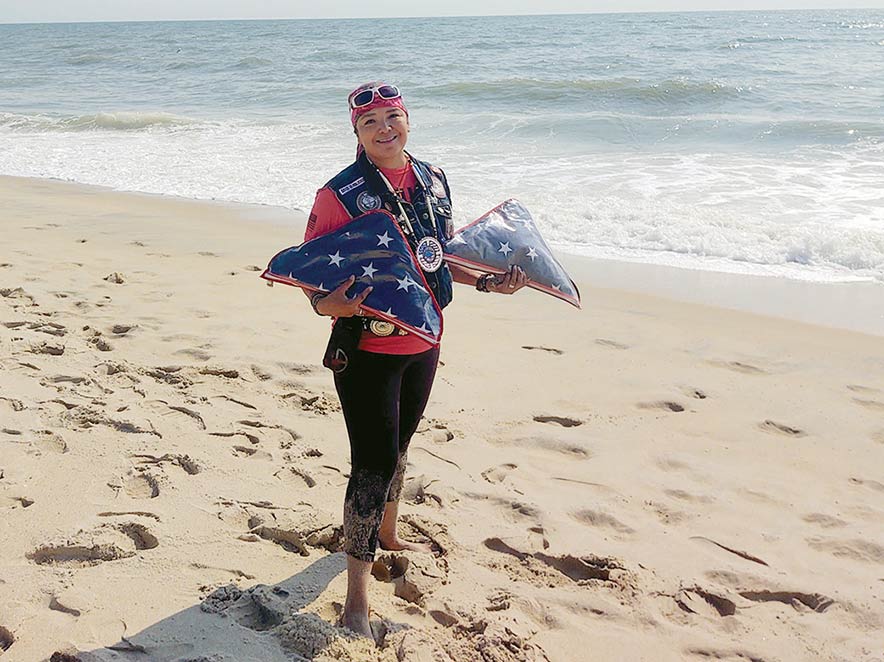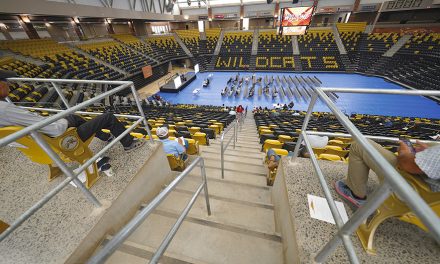
All across the country, we were greeted by patriotic Americans
By Gerri Hongeva -Camarillo
FLAGSTAFF
After a 12-day motorcycle ride across the United States, crossing 15 different states for a total of 5,193 miles, I reflected on my commitment to honor our veterans.

Courtesy photo | Karen Barney
Gerri Hongeva-Camarillo, a board member for the Navajo-Hopi Honor Riders, on the shore of the Atlantic Ocean on May 28, completing her motorcycle journey with the Code Talkers and Freedom flags.
We began on May 23 from my home in Flagstaff. I asked a fellow lady rider, Karen Barney, to join me on this mission of escorting two flags across the United States – the Code Talker Flag and the Freedom Flag.
Both flags are part of the Flags of Honor Escorts developed by David McElroy, a U.S. Air Force veteran from Mississippi.
The Code Talker Flag, which I have been the guardian of since August 2020, has brought awareness of the 25 tribes who used their languages while in military service in both World War I and World War II.
Of course, the Navajo Code Talkers, being credited for the victory in 1945 in the Pacific theater. On July 26, 2001, they (Navajo Code Talkers) were awarded with Congressional gold and silver medals.
On May 23, 2001, the Hopi “Wildcat Division,” 81st Infantry, and the 380th Bombardment group of Hopi Code Talkers, were recognized by state and local dignitaries. The families of the 10 Hopi Code Talkers gathered at Hopi Veterans Memorial Center in Kykotsmovi for a public ceremony.
The Freedom Flag, was transferred to me on May 20 by guardian Leif Meisinger, in Williams, Arizona. He is a member of California CVMA 33-3 and was unable to make the journey across the country due to medical reasons.
Meisinger is a combat veteran and struggles with PTSD, wounds unseen. He told me that I was the only person he trusted with the Freedom Flag, so he asked me to escort the flag to Washington, D.C., to honor all veterans who fought for our freedom.
As Karen and I began our journey, we first made an initial stop at the Navajo Code Talker statue in front of the Gallup Cultural Center. We felt it was important to begin by remembering the brave 300 Navajo Marines who were trained to use our sacred language to help win the war.
Day two, we stopped to visit the Choctaw Veterans Memorial near Oklahoma City. The Choctaw also used their language in both WWI and WWII.
Col. Alfred Wainwright Bloor first noticed two Choctaw Indians speaking their language while in the 142nd Infantry. He couldn’t understand them so he knew the Germans would not understand them too. The US Army began to use them for code talking in WWI.
Memorials we visited include: Sharps Ridge Veterans Memorial Park in Knoxville; Gold Star Memorial at the state capitol of Charlestown, West Virginia; National Native American Veterans Memorial near the Smithsonian Institute in Washington, D.C.; Vietnam Veterans Memorial in Washington; Flight 93 Memorial in Stoystown, Pennsylvania; Tri-State Military Veterans Museum in Belmont, Ohio; National Veterans Memorial & Museum in Columbus, Ohio; Veterans Memorial Park in Richmond, Indiana; Indiana Veterans Nursing Home in West Lafayette, Indiana; Middle Eastern Conflict Wall in Marseilles, Illinois; and Veteran’s Memorial Tribal Park in Window Rock.
On May 29, we were fortunate to have an unplanned meeting with three-star U.S. Army Lt. General Michael Ferriter and U.S. Army Command Sgt. Major Earl Rice at the National Veterans Memorial Museum.
After introducing ourselves as Navajo-Hopi Honor Riders from Arizona and sharing with them how the nonprofit organization began with U.S. Army Spec. Lori Piestewa killed in action on March 23, 2003, they said they were very familiar with the attack on the 507th Maintenance Company at Nasiriyah, Iraq, during Operation Iraqi Freedom.
All across this great country we received warm welcomes and great hospitality from patriotic Americans. Many provided sack lunches, water, Gatorade, pepperoni bread, baked goods, hand-sanitizing gel, hot meals and gas for our motorcycles.
An additional part of our journey as Navajo women was to collect Atlantic Ocean water, which we did on May 28 at Rehoboth Beach in Delaware.
On April 11, my sister, Tarah Weeks, and I collected Pacific Ocean water from the Coronado Beach in San Diego.
In the Navajo and Hopi culture, “Tó éí iiná” (water is life), it is essential to all life on Mother Earth, nahosdzáán.
As a young girl, I noticed that my great-grandmother used to make it a point to bring home Pacific Ocean water to Diné Bikéyah, to ask for rain, moisture for our dry land.
On day 12, as we returned home to Diné Bikéyah, Navajo country, we poured the last of the Atlantic and Pacific ocean water, in hopes that moisture, rain would come to our people here in the Southwest, so the cornfields will be plentiful, so the livestock will have something to drink, so our people can collect the water they need.
Both Karen and I are not veterans. We are surrounded by veterans in our families, in our communities. Riding for our military families is the least we can do, to pay tribute to all those who have served and to remember our fallen heroes, so we can have freedom.
I ride for my father, who was a Vietnam veteran. While riding to Marseilles, Illinois, on Memorial Day, I dedicated that ride to all the Navajo and Hopi veterans whose names are on the Middle Eastern Conflict Wall.
As a board member for the Navajo-Hopi Honor Riders, I thank all the riders who contribute in honoring all veterans and military families year-round.
We (NHHR) are planning stages for the upcoming annual Lori Piestewa Navajo-Hopi Honor Ride scheduled for Aug. 21, 2021.
Information: www.NavajoHopiHonorRiders.com
Geri Hongeva-Caramillo is a member of the board for the Navajo-Hopi Honor Riders.







 Highway 264,
Highway 264, I-40, WB @ Winslow
I-40, WB @ Winslow